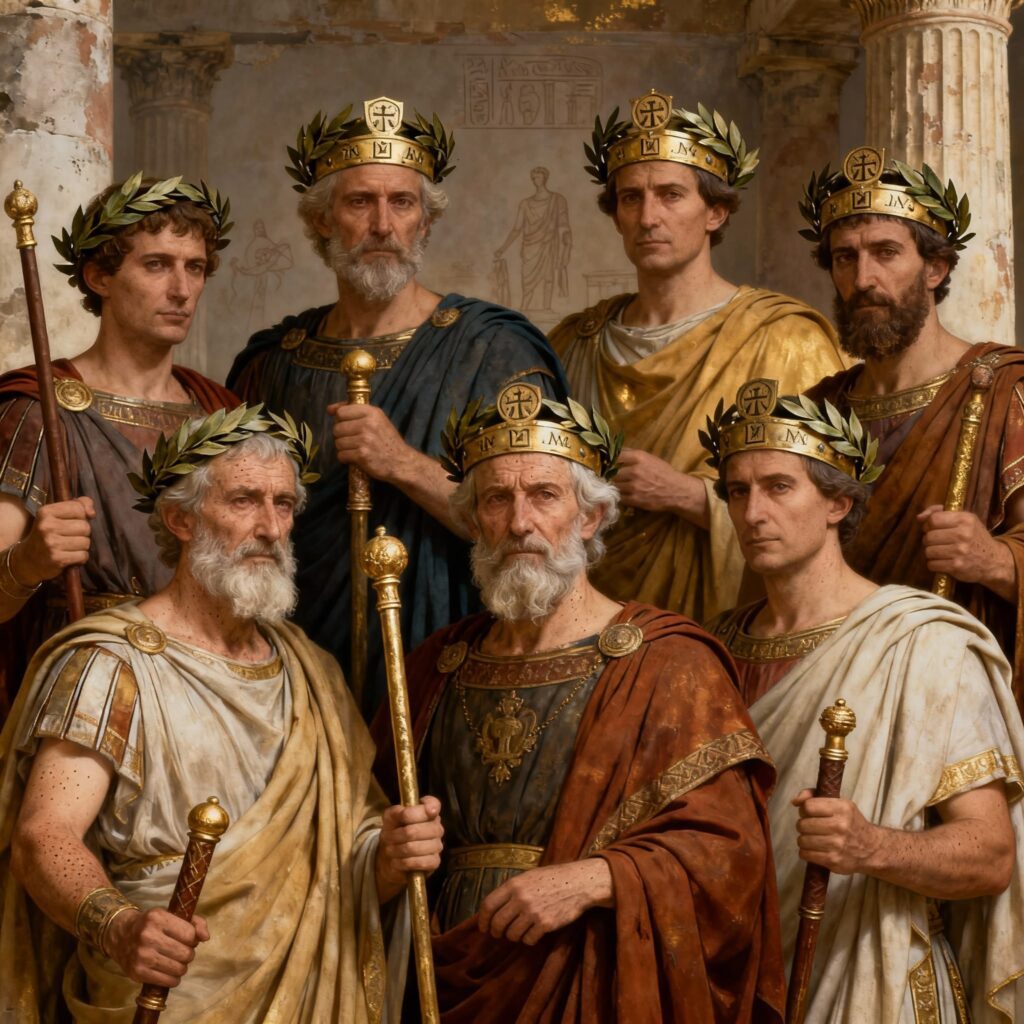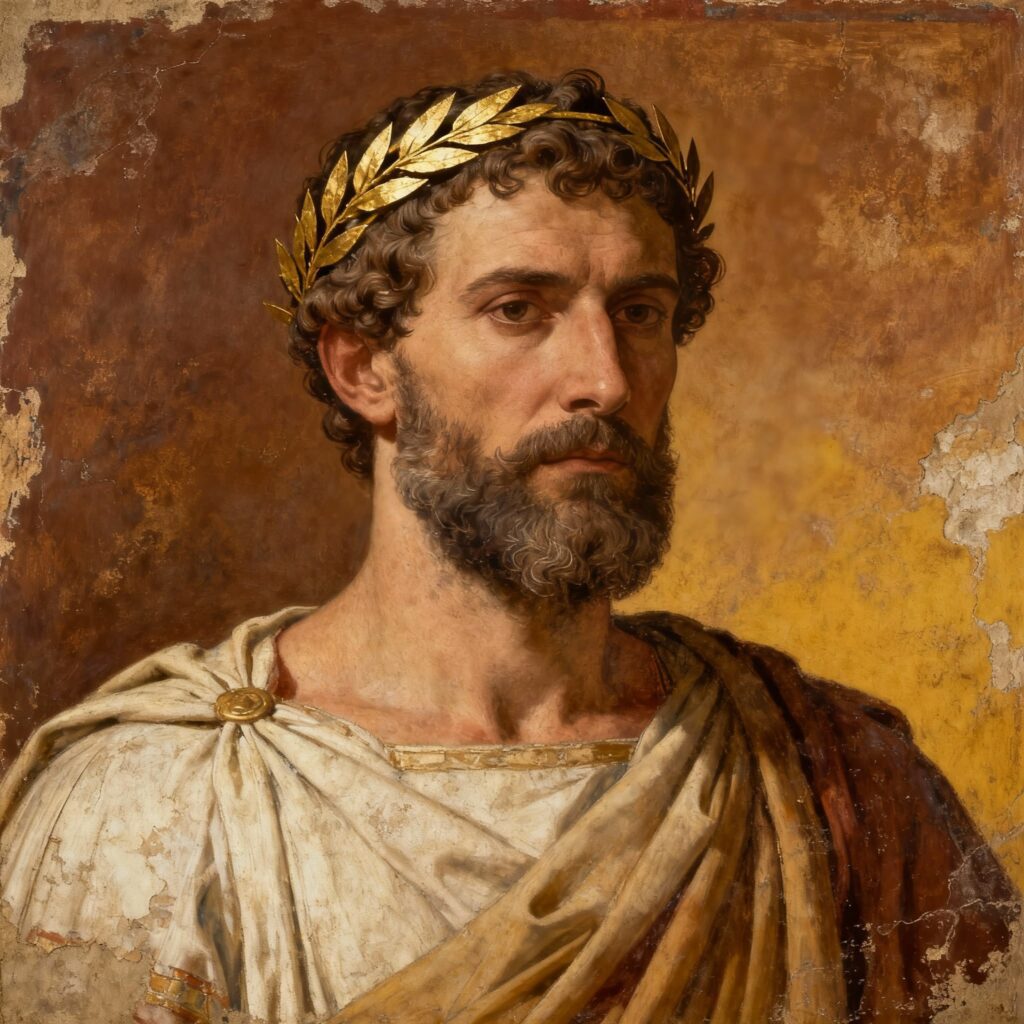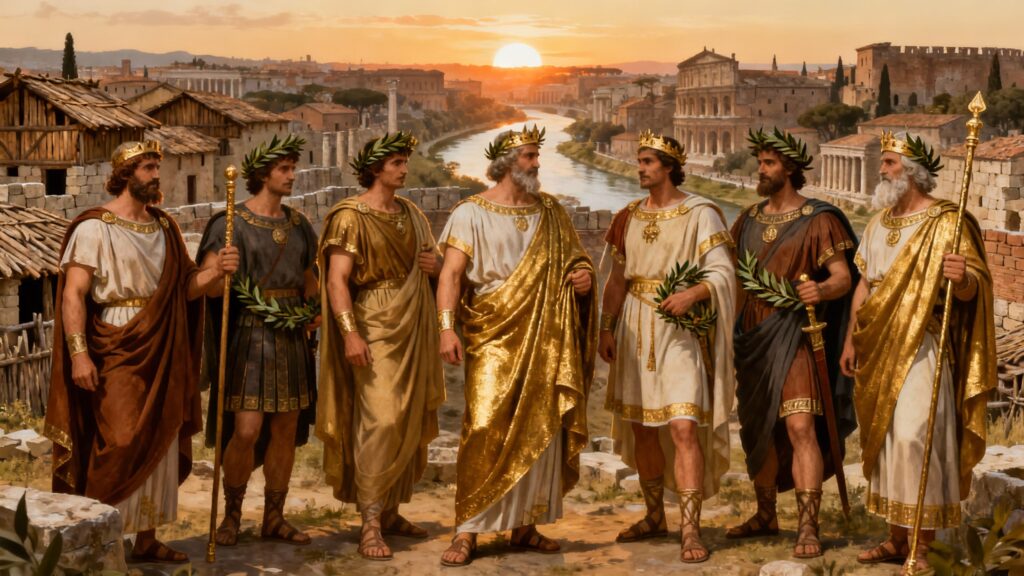The Forgotten Kings of Rome: Before the Republic refers to the seven monarchs who ruled Rome from its legendary founding in 753 BC until the establishment of the Republic in 509 BC. These kings—Romulus, Numa Pompilius, Tullus Hostilius, Ancus Marcius, Servius Tullius, and Lucius Tarquinius Superbus, among others—are often overshadowed by the grandeur of the later Republic and Empire periods. Yet, their reigns laid the essential foundations of Roman society, politics, religion, and law.
For enthusiasts and scholars of early Roman history, understanding this monarchic era is indispensable. The Roman monarchy shaped Rome’s initial institutions, social structures, and cultural identity. The kings were not merely rulers but architects of traditions that endured well beyond their time.
Key takeaway: The Forgotten Kings of Rome played a crucial role in shaping the early city-state and its institutions. Their stories blend myth and history, offering insights into Rome’s evolution from a small settlement to a powerful city. This article explores their reigns, challenges historicity, and highlights their lasting impact on Roman governance and identity.
To delve deeper into this fascinating era of Roman history and its impact on various aspects such as legal systems, economic growth or even social dynamics like gender roles, you can explore more resources on Men of Pompeii, an ultimate online resource dedicated to providing engaging content about Ancient Rome.
The Era of the Roman Kings: An Overview
The period known as the Roman Kingdom spans from 753 BC to 509 BC, marking the foundation and early development of Rome before the Republic. This era was dominated by the rule of a series of monarchs commonly referred to as the Roman kings or legendary rulers. Traditionally, there were seven kings who shaped the early city-state, each contributing in different ways to Rome’s political and social structures.
The Seven Kings of Rome
The traditional list includes:
- Romulus – Founder and first king, credited with establishing Rome and its initial institutions.
- Numa Pompilius – Known for his religious and legal reforms, bringing order and sacred traditions.
- Tullus Hostilius – A warrior king who expanded Roman territory through military conquest.
- Ancus Marcius – Combined military prowess with religious and civic development.
- Lucius Tarquinius Priscus – An Etruscan who increased Rome’s influence and began major construction projects.
- Servius Tullius – Instituted important political reforms including the census and class divisions.
- Lucius Tarquinius Superbus (Tarquin the Proud) – The last king, infamous for his tyrannical rule and eventual overthrow.
Among these, Romulus, Numa Pompilius, and Tarquin the Proud stand out for their lasting impact on Roman culture and governance. Romulus is often celebrated as the city’s mythical founder, while Numa is revered for introducing religious rites that shaped Roman identity. Tarquin’s reign ended the monarchy, signaling a dramatic shift in Roman political life.
Role of Monarchy in Early Rome
The kings held supreme authority, combining religious, military, and judicial powers in a centralized figure. Their role was not merely ceremonial; they were responsible for leading armies in war, administering justice, overseeing religious ceremonies, and managing relations with neighboring tribes and cities.
The monarchy provided a framework for early governance, setting precedents for institutions such as the Senate, which initially served as an advisory council to the king. This centralized system helped stabilize and expand early Rome.
However, this centralized system eventually paved the way for a transition into a more complex political structure known as the Roman Republic. Understanding this transition reveals how these early rulers blended authority, religion, and law to mold Rome’s foundational identity long before the Republic emerged.
The Spectacle of Ancient Rome
While the kings played a significant role in shaping early Rome’s governance, they also influenced its cultural landscape. The era was marked by various forms of entertainment that fascinated the people such as gladiatorial games and chariot races. These spectacles were not just mere entertainment; they had significant effects on social relationships and political authority in ancient Rome.
Daily life in Ancient Rome was vastly different for various social classes during this time period. The patricians enjoyed a life of luxury while plebeians struggled to make ends meet.

The Legendary Nature of the Roman Kings
The stories of Rome’s early kings exist at the crossroads of Roman mythology and historical record, making their true nature complex to pin down. These rulers are often described as semi-mythical kings, whose lives blend heroic tales, divine interventions, and foundational myths with fragments of historical events.
Difficulties in Separating Legend from History
Key difficulties arise when trying to separate:
- Legendary embellishments: Narratives that include miraculous births, divine favor, and supernatural deeds. For example, Romulus is famously said to have been raised by a she-wolf, a story more symbolic than factual.
- Historical reality: The limited archaeological evidence and contemporary written records leave gaps that historians struggle to fill with certainty.
This mixture leads to significant historical debates regarding whether these kings truly existed as individuals or if they represent archetypes created by later Romans to explain their city’s origins and values. Some scholars argue that the accounts were shaped over centuries by oral tradition before being committed to writing. This process naturally introduced exaggerations and moral lessons aimed at promoting Roman virtues.
Challenges in Verifying Ancient Accounts
Ancient sources such as Livy and Dionysius of Halicarnassus provide detailed accounts but wrote centuries after the events they describe. Their works combine history with storytelling techniques common in Roman mythology, further complicating attempts at factual verification.
The challenges historians face include:
- Distinguishing between symbolic acts and actual political developments.
- Verifying timelines when early records are inconsistent or contradictory.
- Identifying archaeological evidence that can corroborate written accounts.
Understanding these difficulties helps explain why the kings remain “forgotten” in many respects—they belong partly to legend as well as history, embodying Rome’s cultural memory rather than a strictly documented past.
The Lasting Influence of the Roman Kings
However, the influence of these early rulers extends beyond mere legend. The foundations they laid in areas such as Roman law, which originated around 753 BCE and lasted until the 5th century CE, continue to shape modern legal systems today.
Moreover, the Roman army, a symbol of military power established during their reigns, played a crucial role in the growth and upkeep of the empire. Its structure, strategies, and operational effectiveness were key in achieving victories across large areas.
The roads built during this time also had a lasting impact. These Roman roads, which served as vital arteries for trade and military movement, were instrumental in maintaining and expanding the empire.
In addition to these aspects, it’s essential to recognize the role of societal dynamics during this period. The plebeians, who comprised a diverse group of free citizens not part of the patrician elite, significantly influenced the development of political and economic structures in Rome.
Lastly, we cannot overlook the philosophical influences that emerged during this era. The rise of Stoicism, a school founded in ancient Greece around 300 BCE, emphasized living in harmony with nature.

Profiles of Selected Kings
The stories of Romulus, Servius Tullius, and Lucius Tarquinius Superbus stand out distinctly among the narratives of The Forgotten Kings of Rome: Before the Republic. Their reigns reveal crucial aspects of early Roman society, governance, and the eventual decline of monarchy.
Romulus: Founding of Rome and the First King
Romulus is credited as the legendary founder and first king of Rome. According to tradition, he established the city in 753 BC after a series of dramatic events, including the famous story of Romulus and Remus being raised by a she-wolf. His reign set the foundation for Rome’s institutions and social structure.
- Founding acts: Romulus organized Rome’s first population by creating tribes and curiae, the early political divisions that shaped Roman identity.
- Military beginnings: He established the Roman legions by recruiting fugitives and exiles, blending diverse groups into one community.
- Political structures: Romulus is said to have formed the Senate, composed initially of 100 men called patres, who acted as advisors and elders.
Romulus’ legacy is less about verified historical facts and more about symbolic representation. He embodies Rome’s origin myth, establishing the city’s early political and social order.
Servius Tullius: Reforms and Early Roman Society
Servius Tullius, traditionally the sixth king, introduced critical reforms that transformed Rome’s social and political landscape.
- Census and class division: Servius implemented a census that classified citizens based on wealth, which determined military and voting responsibilities. This system laid the groundwork for the Roman class structure.
- Expansion of citizenship: He expanded political participation beyond the patrician class, incorporating plebeians into the early political framework.
- Urban development: Servius is credited with constructing Rome’s first city walls, known as the Servian Wall, enhancing the city’s defense.
- Religious contributions: He promoted religious institutions strengthening social cohesion, associating kingship with sacred duties.
Servius Tullius’ reign marks a shift from purely legendary to more administrative leadership, reflecting early attempts to organize society pragmatically.
Lucius Tarquinius Superbus: Tyranny and the Last King of Rome
Lucius Tarquinius Superbus, the seventh and final king, represents the darker end of the Roman monarchy.
- Seizure of power: He came to power through violence, reportedly assassinating his predecessor, Servius Tullius, to claim the throne.
- Authoritarian rule: Tarquinius ruled without consulting the Senate, executing senators who opposed him and controlling Rome through fear.
- Military campaigns: He led several successful military endeavors, expanding Roman influence but also consolidating personal power.
- Monumental projects: Under his reign, major constructions like the Temple of Jupiter Optimus Maximus were completed, symbolizing Rome’s growing prominence.
- Downfall: The abuse of power culminated in the infamous crime committed by his son Sextus Tarquinius against Lucretia, sparking revolt.
Tarquinius Superbus’ tyranny directly led to the abolition of the monarchy and the birth of the Roman Republic, marking a critical turning point in Roman history.

These kings illustrate different facets of Rome’s early development—from mythical foundations through societal reforms to despotic decline—each contributing uniquely to the city’s complex legacy.
The Fall of the Monarchy and the Rise of the Republic
The end of the Roman monarchy is a story of personal tragedy and political turmoil. It all began with a crime committed by Sextus Tarquinius, the son of the last king, Lucius Tarquinius Superbus. Sextus assaulted Lucretia, a noblewoman known for her virtue, which shattered any remaining trust in the Tarquin dynasty. This act sparked outrage among the Roman citizens who were already fed up with the oppressive rule of the king.
The Incident that Sparked Change
The incident involving Lucretia became a turning point. After revealing what had happened to her, Lucretia took her own life, an act that motivated both the Roman aristocracy and common people to take action. This event crystallized public sentiment against tyranny and galvanized support for overthrowing the monarchy.
Lucius Junius Brutus emerged as the decisive leader in this movement. He harnessed the collective anger to orchestrate a rebellion aimed at ending the Tarquin family’s hold on power. Brutus’ leadership was instrumental in rallying Rome’s citizens and nobles alike to challenge the existing regime.
Key Outcomes of the Rebellion
The rebellion led by Brutus resulted in several significant outcomes:
- Exile of the Tarquin family: The Tarquin monarchy was effectively brought to an end.
- Establishment of the Roman Republic: A new system of governance was introduced, where representatives were elected and power was shared.
- Creation of political institutions: Structures were put in place to prevent any single ruler from having unchecked authority.
This pivotal transition marked not only an end to monarchic rule but also laid down foundations for centuries of Republican governance in Rome.
The Significance of this Shift
The shift from monarchy to republic is more than just a historical event; it signifies a fundamental change in governance that has shaped modern political systems around the world. The birth of the Roman Republic brought about these crucial transformations which are key to understanding both ancient Rome’s complexities and its lasting influence on our society today.
Legacy and Historical Significance of the Forgotten Kings
The legacy of Roman kings goes beyond their often exaggerated stories. It has become an essential part of Rome’s political and social structure. These early rulers laid the groundwork for how the Republic would be governed, influencing Roman politics for centuries to come.
Influence on Governance
The kings of Rome had a significant impact on the governance system that followed them:
- The Senate, which became more important during the Republic, actually originated from the advisory council established under the monarchy. Kings like Numa Pompilius played a key role in formalizing the Senate’s function, establishing precedents for its power and organization.
- Legal and religious customs, such as the establishment of laws and religious ceremonies, were introduced by kings like Servius Tullius. His reforms regarding Roman citizenship and census set the stage for future political organization, similar to how the Corpus Juris Civilis preserved ancient Roman legal principles while adapting them to modern society.
- The idea of imperium, which refers to the legal authority to command, was initially held by the king but later adapted for consuls and magistrates. This shows a continuity in governance practices over time.
Shaping Roman Identity
The stories and institutions connected to these rulers continued to shape Roman identity even after the monarchy fell:
“The memory of these kings served as a cultural touchstone, reminding Romans of their city’s origins and the evolution from a kingdom to a republic.”
Many values associated with the kings—such as duty towards the state, respect for tradition, and the blending of religion with politics—remained important in Roman society.
Religious Practices and Their Impact
The [religious practices](https://www.menofpompeii.com/exploring-the-ancient-roman-religion) established during this time were not just beliefs but an all-encompassing system that influenced every aspect of life:
- From the early days of the Roman Republic
- To the vast reach of the Empire
Religion played a crucial role in shaping Roman identity, impacting politics, culture, and social structures.
Legacy Leading to Empire
This legacy ultimately set the stage for the rise and fall of the Roman Empire. The ancient civilization left an unforgettable mark on the world, shaping politics, culture, and society in ways that still resonate today.
Conclusion
The legacy of the forgotten kings is an important part of Roman history. These rulers, often overlooked by the grandeur of the Republic and Empire, played a crucial role in connecting Rome’s legendary beginnings to its historical development. By studying their reigns, we can gain a better understanding of how the monarchy’s downfall led to the rise of new political ideas.
The Forgotten Kings of Rome: Before the Republic were key figures in shaping early institutions and social norms, and their influence can be seen in the foundations of the Republic and beyond. Their stories offer opportunities for further exploration and contemplation for anyone interested in Roman history.
The impact of these kings is not only evident in political systems but also in various aspects of Roman life such as engineering, mythology, art, culture, and social structures. For example, Roman engineering achievements have left a lasting legacy on future generations, serving as a basis for modern infrastructure.
Furthermore, the influence of Roman mythology on contemporary culture demonstrates how these ancient stories were adapted to reflect societal values and political ambitions. Additionally, the complex role of gladiators in Roman entertainment reveals another intriguing aspect of this captivating history.
Finally, the artistic expressions during this time period, characterized by significant advancements in sculpture and mosaics as discussed in our exploration of art and culture in ancient Rome, further exemplify the rich legacy left behind by these forgotten kings.
FAQs (Frequently Asked Questions)
Who were the Forgotten Kings of Rome and why are they important?
The Forgotten Kings of Rome refer to the early monarchs who ruled before the establishment of the Roman Republic. Despite often being overlooked, these kings played a crucial role in shaping early Rome’s city-state and its foundational institutions, making their study essential for understanding Roman history.
What is the timeline and significance of the Roman Kingdom era?
The Roman Kingdom era spans from 753 to 509 BC and encompasses the reigns of traditionally seven kings, including Romulus, Numa Pompilius, and Tarquin the Proud. This period was significant as it laid down the political structure and societal norms that influenced early Rome’s development.
How do historians view the legendary nature of Rome’s early kings?
Historians recognize that accounts of Rome’s early kings blend mythology with historical facts. Due to this mixture, there are challenges in verifying their actual existence and separating mythological embellishments from real historical events.
What were some notable contributions of key Roman kings like Romulus, Servius Tullius, and Lucius Tarquinius Superbus?
Romulus is credited with founding Rome and serving as its first king. Servius Tullius introduced important reforms that shaped early Roman society. Lucius Tarquinius Superbus, known for his tyranny, was the last king whose reign ended with the monarchy’s fall.
What events led to the downfall of the Roman monarchy and the rise of the Republic?
The monarchy fell after Sextus Tarquinius committed a grave crime against Lucretia, sparking public outrage. Led by Lucius Junius Brutus, a rebellion ensued that resulted in the exile of the Tarquin family and the establishment of the Roman Republic governance system.
What is the lasting legacy of the Forgotten Kings on Roman governance and identity?
The Forgotten Kings laid the groundwork for future political institutions such as the Senate. Their influence endured beyond their reigns, shaping Roman identity and governance practices even after the monarchy ended, bridging mythic origins with historical reality.

